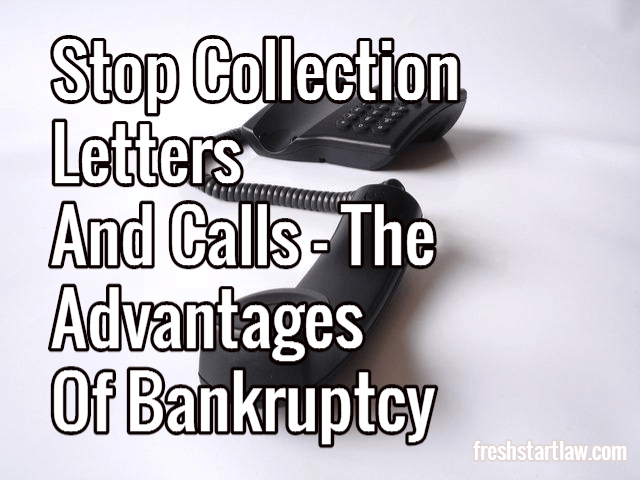Stop Collection Letters And Calls – The Advantages Of Bankruptcy

If you are behind on credit card or mortgage payments you might be receiving letters or phone calls from collection agencies. This can be a great source of stress for anyone facing financial difficulties. One way to recover from a difficult debt situation is to file for bankruptcy. Stopping the collection letter is just one of the advantages of bankruptcy.
Bankruptcy Is A Process Not A Punishment
Many people think that bankruptcy is something negative. Nobody wants to have financial trouble, but unavoidable circumstances sometimes happen. Some common reasons why people file for bankruptcy are:
- Large medical expenses
- Unemployment
- Overspending
- Divorce
- Natural disaster or accidents
No matter what the cause, filing for bankruptcy is a legal process that helps you to get back on your feet again. Good legal counsel helps make sure the process goes smoothly and that all your rights are protected.
Where Collection Letters Come From
Whenever a person has outstanding debt, the lender eventually might contact a collection agency to collect the debt. Collection agencies charge a fee or receive a percentage of the total amount owed. Letters and phone calls are the most common ways that the agencies use to contact borrowers.
How Bankruptcy Protection Works
Once a person decides to file for bankruptcy, they must fill out a bankruptcy petition. The petition collects all the information necessary about your case to be presented to the bankruptcy court. As soon as the bankruptcy petition is filed, a letter is sent to every creditor for an “automatic stay”. This means that all collection efforts must stop immediately while the case is resolved through the bankruptcy proceedings.
Settling Debts
Filing for bankruptcy is a way for you get a fresh start. A bankruptcy trustee is appointed to each case to coordinate the process, and agreements are made with each creditor regarding terms of payment. In Chapter 7, bankruptcy payment comes from the sale of non-exempt assets. In Chapter 13, a monthly payment schedule is arranged. In both cases creditors agree to the terms, and debt is wiped clean.
Education And Counseling
Filing for bankruptcy also provides you with the opportunity to attend debtor education and counseling. Credit counseling is actually required before you file, and a good lawyer can help explain how this process works. After your debts are discharged, you will also attend a debtor education course which helps you develop a personal budget, manage money, and use credit wisely.
Credit Rating Issues
Falling behind on their credit card, mortgage or other payments causes a fall in your credit score. Filing for bankruptcy is often the first step to stop credit scores from deteriorating further.
Other Benefits
Bankruptcy can stop or delay foreclosure on your home, and it can prevent the repossession of your personal vehicle or other property. Bankruptcy can also allow you to make a claim against the fraudulent repossession of your assets. Finally, utility services can be restored when you file for bankruptcy.
Conclusion
Financial difficulty can arise due to many reasons. Bankruptcy is a legal option that puts an end to collection calls and restores order to a person’s finances.
Call Today For A Free Consultation
Contact Sirody & Associates for a FREE Consultation and advice from attorneys that specialize in bankruptcy law. Let our attorneys work to get you back on your feet.
